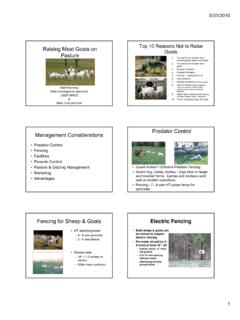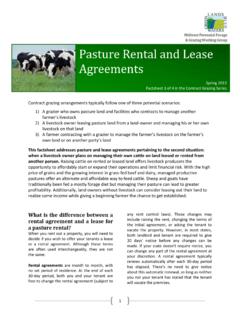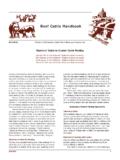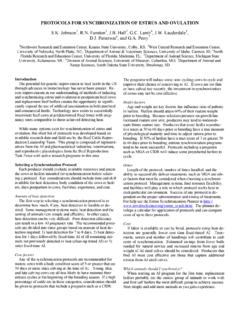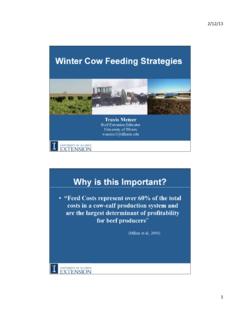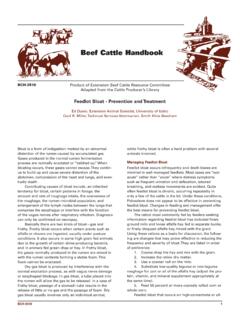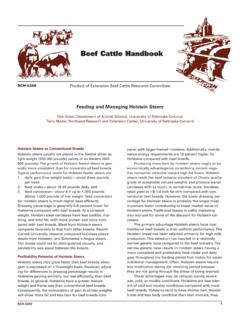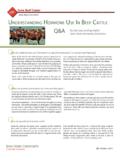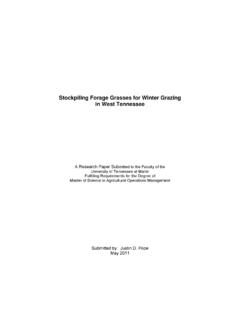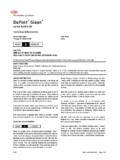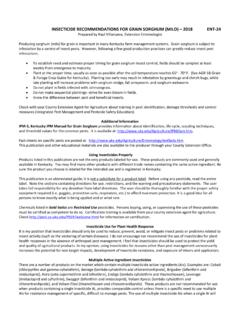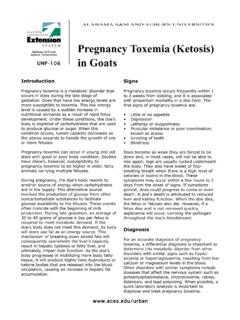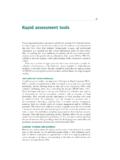Transcription of Rates Charged for Contract Grazing Arrangements
1 Rates Charged for Contract Grazing Arrangements Spring 2013. Factsheet 4 of 4 in the Contract Grazing Series Contract Grazing Arrangements typically follow one of three potential scenarios: 1) A grazier who owns pasture land and facilities who contracts to manage another farmer's livestock 2) A livestock owner leasing pasture land from a land-owner and managing his or her own livestock on that land 3) A farmer contracting with a grazier to manage the farmer's livestock on the farmer's own land or on another party's land This factsheet addresses Rates Charged for Contract Grazing Arrangements similar to the first situation.
2 When a grazier is hired to manage someone else's livestock on the grazier's own land. There are two common ways to determine payment Rates Charged by the grazier: flat Rates , or incentive pay. Flat Rates Type of cattle operation (dairy, cow- One of the most common strategies for calf, yearling beef, etc). determining payments for Contract Grazing is to In-weights of the cattle charge a flat rate per animal per day. Rates Reputation of the grazier Charged per day vary over a range of prices. The tables shown below give examples of possible Chief among the factors influencing the rate price ranges for a two-party Contract Grazing Charged is the reputation of the grazier, and the system (a livestock owner and a land- relationship between the grazier and livestock owner/grazier) for cattle grazed in Wisconsin owner.
3 An experienced and knowledgeable and Southern Iowa as of Spring 2013 (tables 1 grazier will command higher charges, because and 2, respectively). The values shown in the they are expected to show high performance tables are meant only as ballpark figures. Actual (high weight gain, milk production, etc) with the Rates Charged are influenced by several factors, cattle they are Grazing . An experienced grazier including: with a good reputation is also expected to maintain this level of production given Estimated value of the land being variability in climate and the pasture growing grazed season (for example, they should be able to Level of labor and number of services maintain high animal performance in all but the provided by the grazier worst of droughts).
4 1. liability insurance, and trucking to market. Those that expect the grazier to cover those costs are likely to see a Grazing fee that is on the upper end or even higher than the Rates estimates show in tables 1 and 2. Additionally, cattle raised as organic-certified may incur fee charges that are $ higher than the highest values in the ranges given. Incentive Pay Contract Grazing fees can also be scheduled as incentive pay, meaning that the payments are The receiving weights, or in-weights , of cattle based on production of the animal. In such can also affect which end of the price range the cases, a base Grazing fee per head per day is charge will be; animals that are lower in weight established (such as those values shown in may be at the lower end of the range, whereas tables 1 and 2), but as goals such as increased heavy animals may be at the high end.
5 As an average daily gain or milk production are met, example, a grazier with a good reputation may an additional fee is paid on top of that base. charge $ for developing replacement dairy heifers with an in-weight of 500-550lbs, Another version of incentive pay for beef but increase that rate to $ for heifers finishing operations is to not utilize the base that have an in-weight of 650-700lbs. Fees fee, but rather split the price earned at market Charged for Contract Grazing cattle can also for that weight put on while under the care of depend on the services to be provided by the the custom grazier.
6 Grazier that are included in the Contract . Many contracts assume the cattle owner will take on the cost of services such as veterinary care, Table 1: Expected price ranges for various Contract Grazing operations in Wisconsin. Prices reflect the amount that the livestock owner would pay to the grazier. (Note: Rates are approximations for spring 2013.). Livestock Class Typical Price Range (cost per head per day). Heifers Dairy $ Beef $ Pregnant cows Dairy $ +. Beef $ 2. Table 2: Expected price ranges for various Contract Grazing beef cattle operations in south-central Iowa.
7 These fees include labor and mineral provided by the grazier. Prices reflect the amount that the livestock owner would pay to the grazier. (Note: Rates are estimations for spring 2013). Livestock Class Typical Price Range Average Cost (cost per head per day) (per head per day). Cows-calf pairs (beef) $ $ Yearlings and $ $ developing heifers (beef). Dry, pregnant cows $ $ (beef). Other fact-sheets in this series include: The Basics of Contract Grazing Evaluating Land Suitability for Grazing Pasture and Lease Agreements For more information contact: Joe Sellers, Iowa State University Extension Dick Cates, University of Wisconsin Madison Phone: (641) 203-1270 Phone: (608) 588-2836.
8 Email: Email: 3.
